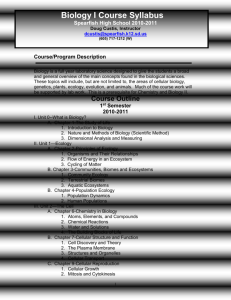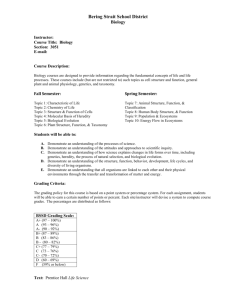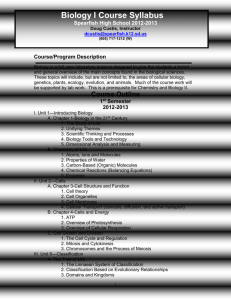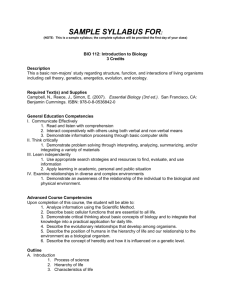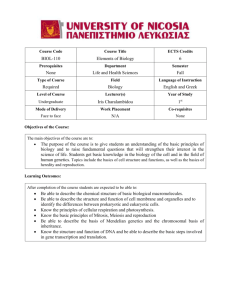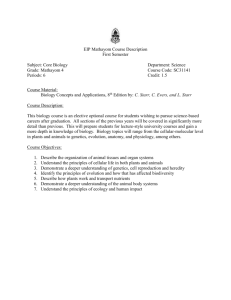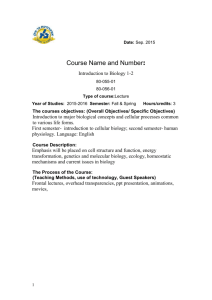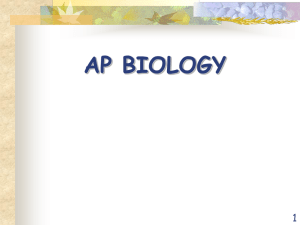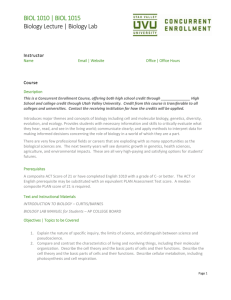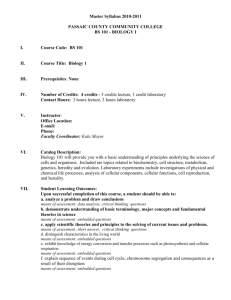2009-2010
advertisement
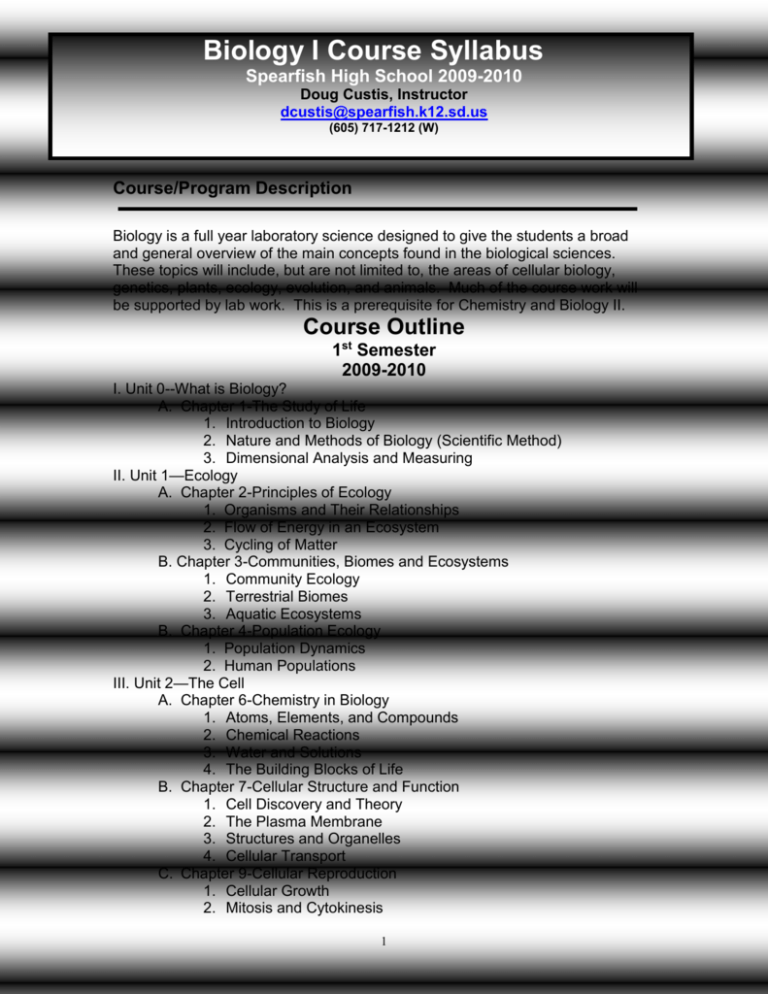
Biology I Course Syllabus Spearfish High School 2009-2010 Doug Custis, Instructor dcustis@spearfish.k12.sd.us (605) 717-1212 (W) Course/Program Description Biology is a full year laboratory science designed to give the students a broad and general overview of the main concepts found in the biological sciences. These topics will include, but are not limited to, the areas of cellular biology, genetics, plants, ecology, evolution, and animals. Much of the course work will be supported by lab work. This is a prerequisite for Chemistry and Biology II. Course Outline 1st Semester 2009-2010 I. Unit 0--What is Biology? A. Chapter 1-The Study of Life 1. Introduction to Biology 2. Nature and Methods of Biology (Scientific Method) 3. Dimensional Analysis and Measuring II. Unit 1—Ecology A. Chapter 2-Principles of Ecology 1. Organisms and Their Relationships 2. Flow of Energy in an Ecosystem 3. Cycling of Matter B. Chapter 3-Communities, Biomes and Ecosystems 1. Community Ecology 2. Terrestrial Biomes 3. Aquatic Ecosystems B. Chapter 4-Population Ecology 1. Population Dynamics 2. Human Populations III. Unit 2—The Cell A. Chapter 6-Chemistry in Biology 1. Atoms, Elements, and Compounds 2. Chemical Reactions 3. Water and Solutions 4. The Building Blocks of Life B. Chapter 7-Cellular Structure and Function 1. Cell Discovery and Theory 2. The Plasma Membrane 3. Structures and Organelles 4. Cellular Transport C. Chapter 9-Cellular Reproduction 1. Cellular Growth 2. Mitosis and Cytokinesis 1 Course Outline 2nd Semester 2009-2010 IV. Unit 3—Genetics A. Chapter 10-Sexual Reproduction and Genetics 1. Meiosis (review Mitosis) 2. Mendelian Genetics 3. Gene Linkage and Polyploidy B. Chapter 11-DNA and Genes 1. DNA: The Molecule of Heredity (Brief) C. Chapter 12-Paterns of Heredity and Human Genetics 1. Mendelian Inheritance of Human Traits 2. When Heredity Follows Different Rules 3. Complex Inheritance of Human Traits V. Unit 4—History of Biological Diversity A. Chapter 14-History of Life 1. Fossil Evidence of Change 2. The Origin of Life B. Chapter 15-Evolution 1. Darwin’s Theory of Natural Selection 2. Evidence of Evolution 3. Shaping Evolutionary Theory C. Chapter 17-Organizing Life’s Diversity 1. Classification 2. The Six kingdoms VI. Unit 6—Plants A. Chapter 21-Introduction to Plants 1. Plant Adaptations 2. Nonvascular Plants 3. Vascular Plants B. Chapter 22-Plant Structure and Function 1. Plants Cells and Tissues 2. Roots, Stems, and Leaves 3. Plant Hormones and Responses C. Chapter 23- Reproduction in Plants 1. Introduction to Plant Reproduction 2. Flowers 3. Flowering Plants Materials/Textbook Information 1. Text: Biology Publisher: Glencoe 2. Three-Ring binder with loose leaf paper is recommended. 2 Course Requirements 1. Students are expected to bring their notebook, text book and something to write with everyday. 2. Notebooks will be organized according to the format provided by the Instructor. 3. Students are expected to participate in class discussions and activities. 4. Attendance is extremely important. When it is necessary to miss class students need to get missed work and visit with the instructor. Class Projects Each student will take part in an ecosystem study. The study involves a written research paper, a visual aid and an oral presentation. Writing Projects Each quarter students will complete a writing assignment. This is in accordance with our School Improvement/NCA Plan. Class Procedures and Rules 1. Report to class ready to learn and participate 2. School tardy policy will be enforced. 3. Food and drink are not allowed. The only exception is water in a clear, plastic container. 4. Treat others how you expect to be treated. 5. Students are expected to clean-up after themselves. 6. Inappropriate behavior in the lab will not be tolerated. This is your only warning. 7. The student is expected to do their own work. There is never an acceptable excuse for cheating. The schools policy on cheating will be strictly enforced. 8. Coats and book bags will not be allowed at the student’s desk. They will be placed in the rear of the room so they are not taking up space in the rows between the desks. Laptop and Internet Procedures 1. As a rule the laptops will not be used in class. If they are needed you will be notified in advance. 2. For all other issues concerning the laptops refer to the student handbook. Homework Procedures 1. Homework will be assigned a due date and that is when it is to be turned in. 2. Late work will not be accepted. 3. Homework is more than just completing an assignment. It is designed to be a learning exercise. Homework assignments often lead to quizzes. 3 Assessment Plan The school wide-grading scale will be used. 96-100 A 92-95 A89-91 B+ 86-88 B 83-85 B79-82 C+ 76-78 C 73-75 C69-72 D+ 65-68 D 60-64 D- How is your grade determined? Student assessment will be based on homework, tests and quizzes, labs and any projects that are assigned. The student is expected to monitor their grade throughout the semester. Grade Rounding Policy: Grade values of .5 or higher will be rounded to the next whole number. Make-Up Work 1. Follow school policy unless other arrangements are made. 2. If a student is absent on a day when a test is scheduled the student will take an alternative form of the test. The test will cover the same material and may or may not be of the same format. General Information Absences: 1. Keep absences to a minimum. The reason why you were gone isn’t important. What is important is that you missed valuable time in class. 2. If you are absent it is your responsibility to get the make-up work. Extra Help: Extra help is always available. I am available during Spartan Time, before and after school. It is up to the student to ask for extra help. 4
